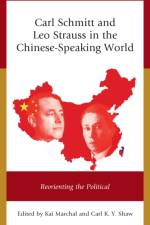- Reorienting the Political
von Kai Marchal & Carl K. Y. Shaw
72,00 €
Carl Schmitt and Leo Strauss in the Chinese-Speaking World: Reorienting the Political examinesthe reception of Carl Schmitt and Leo Strauss in China and Taiwan. The legacies of bothSchmitt, the German legal theorist and thinker who joined the Nazi party, and Strauss, theGerman-Jewish classicist and political philosopher who became famous after his emigrationto the United States, are highly controversial. Since the 1990s, however, these thinkers havehad a powerful resonance for Chinese scholars. Today, when Chinese intellectuals debate theChinese state, the future role of China in the world, the liberal international order, and eventhe meaning of Confucian civilization, they often employ Schmittian and Straussian conceptslike ';the political,' ';friendenemy,' ';state of exception,' ';liberal education,' and ';naturalright.' The very possibility of a genuine Chinese political theory is often thought to be tied tothe legacy of these two thinkers.This volume explores this complex phenomenon with a cross-cultural and interdisciplinaryapproach. The twelve essays in this volume are written from a range of perspectives by philosophers,political theorists, historians, and legal scholars from China, Germany, Taiwan,and the United States.




